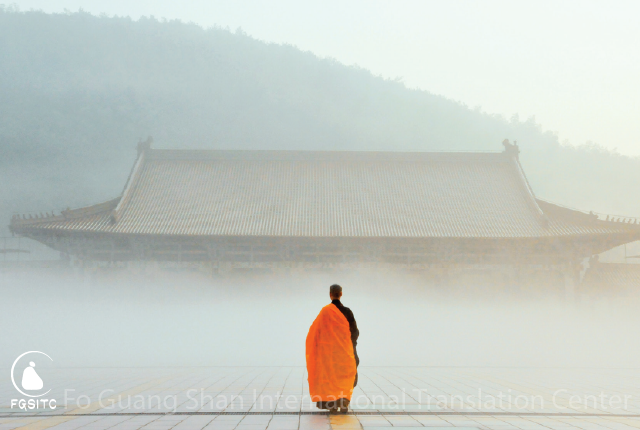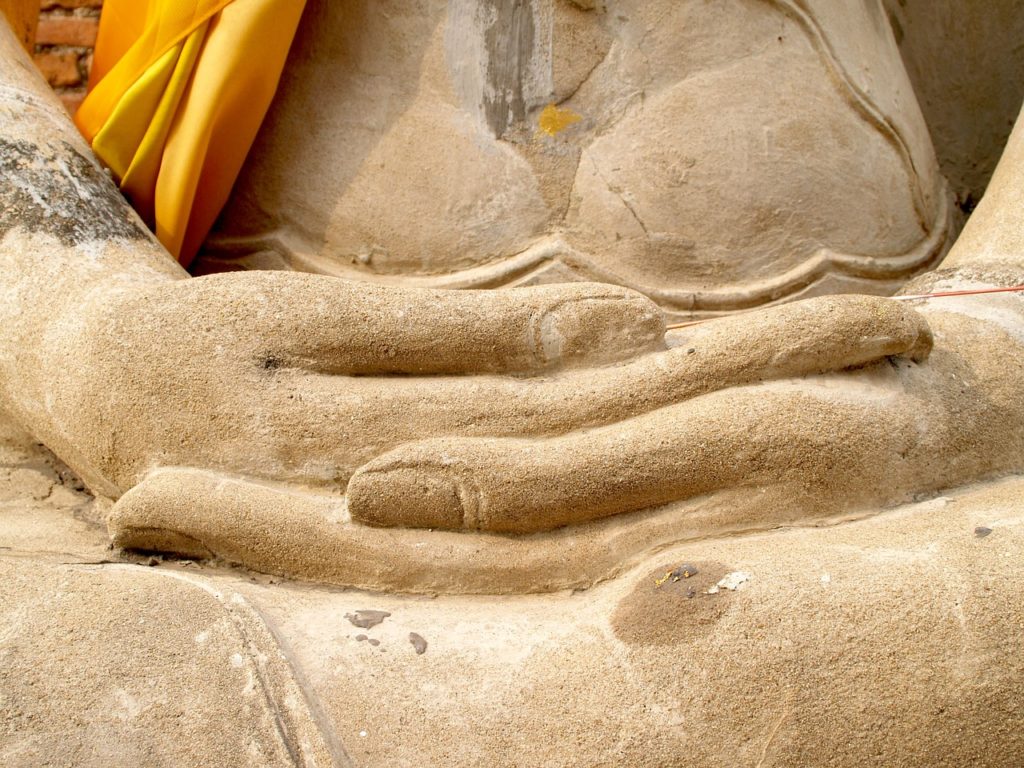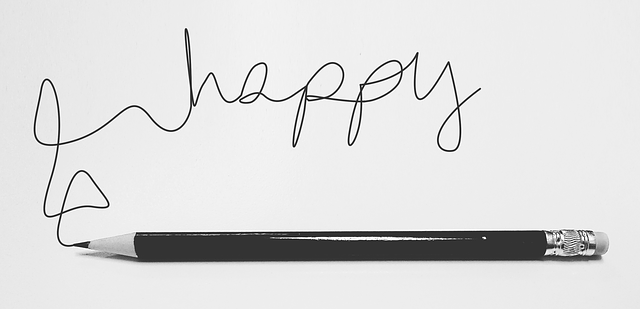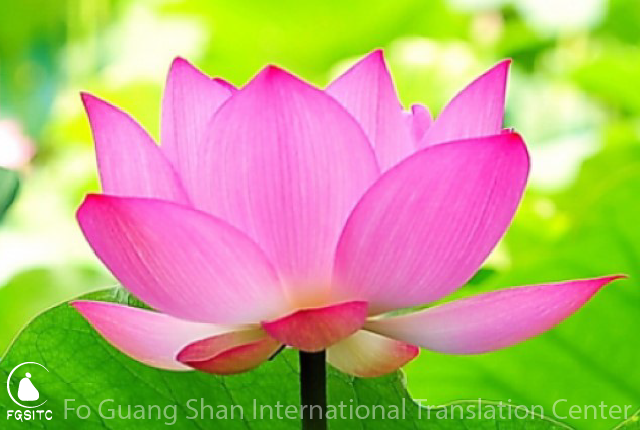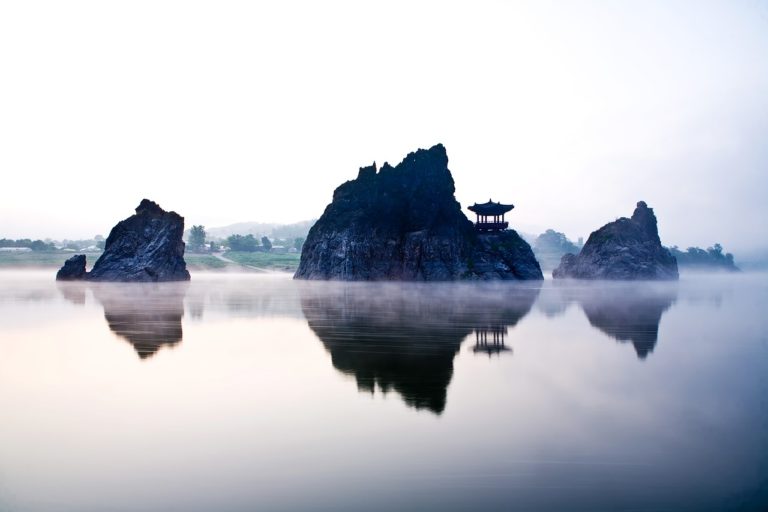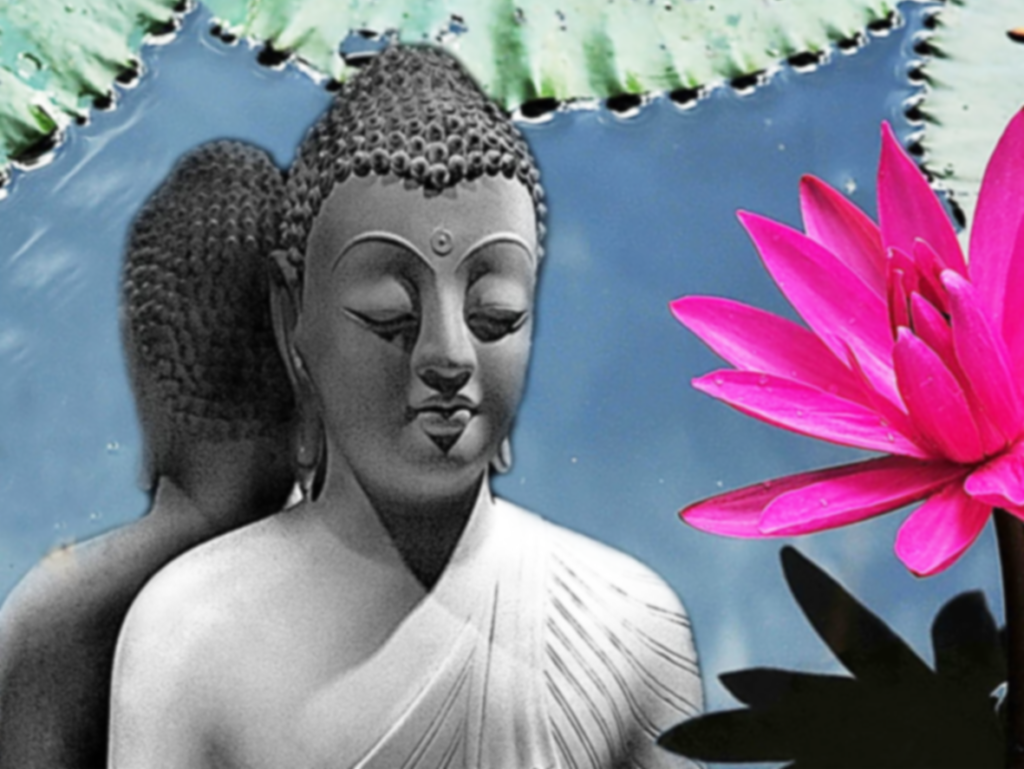
What is the fastest thing in the universe? Of course, everyone knows it is light, which moves at three hundred thousand kilometers per second. However, in Buddhism, the fastest thing is not light but a person’s mind. The speed of mind is several hundred times faster than light and is not limited by time and space. In a flash you can think of Li Bo, a famous poet in the Tang dynasty, and in the next moment you can think of the scenery in Los Angeles, California. In a moment of thought, you can travel up throughout the heavens and down into the deep underworld. Hence, the speed of mind is the fastest. Phenomena of the world are not separate from the mind.
A Buddhist sutra says,
“The three realms are mind-only, and all phenomena are consciousness-only.”
Mind and consciousness are the origin of karmic causes and effects. It is said, “When there are perceptions and thoughts in the mind, there is the cycle of birth and death; when there are no perceptions and thoughts in the mind, that is nirvana.” All phenomena arise from the defiled mind and deluded thoughts.
After the Sixth Patriarch Master Huineng attained awakening, he hid himself in a group of hunters for ten years. He started to propagate the Dharma only when the opportunities and conditions were ripe. One time he came to Guangzhou and saw two monks were arguing over a flapping banner.
One monk said, “The wind is moving; it is not the banner moving.”
The other monk said, “The banner is moving; it is not the wind moving.”
“Without the wind, how could the banner move? It was the wind’s moving.”
“No, no. Wind by nature is moving. The wind does not move, even though it is blowing. Just like the nature of flowing water is flowing, but in fact, flowing water is not flowing. It is also like when you sit in a moving carriage looking out the windows. The scenery appears to be moving because the carriage is moving. The scenery, in fact, is not moving. It is the banner’s moving, not the wind.”
The Sixth Patriarch saw both monks standing their ground, refusing to budge. Smiling, he walked over to them and tried to resolve the
issue. “Why are both of you so attached to this? The wind is not moving, and the banner is not moving. Your minds are moving.”
It doesn’t matter whether it was the wind or the banner that was moving; both of them are illusory appearances of outside objects.
We do not need to attach our minds to the appearances and let the mind be controlled by objects. When the mind is controlled by objects, the mind is moving. When the mind is moving, a thought arises and ceases in an instant—this is a moment of the mind. If the wind is moving, so be it; if the banner is moving, so be it; then there is nothing moving in the mind. One looks but does not see; one hears but does not listen. The mind completely abides in the intrinsic nature of equality and does not fall into ignorance and affliction. This immovability of the mind in according to suchness is an eternity of the mind.
In the Tang dynasty, Chan Master Deshan Xuanjian applied great effort to studying the Diamond Sutra and composed the Blue Dragon Commentary on the Diamond Sutra in the North. He disagreed with the propagation of “sudden awakening and becoming a Buddha” in the South, so he carried his work of The Blue Dragon Commentary on the Diamond Sutra and headed to the South, intending to dispel the Chan teachings of sudden awakening by the Sixth Patriarch. Chan Master Deshan’s trip was difficult and exhausting. One day he was tired from walking. He saw a small store by the roadside selling cakes and wanted to purchase some to sate his hunger. An old lady in the store greeted him with a smile when she saw him walking in.
“What are you carrying on your shoulder, Chan master?”
“This is my commentary on The Diamond Sutra.”
“Oh, where are you carrying it to?”
“To the South.”
“To do what?”
“To dispel the Chan teachings of sudden awakening in the South.”
The old lady nodded, thought for a while, and said, “I am studying The Diamond Sutra and there is a sentence that I don’t understand. Chan master, please explain it to me. If you can answer my question, I will offer you cakes for free.”
Chan Master Deshan laughed. “Please ask.”
The old lady asked, “The Diamond Sutra says, ‘The mind of the past cannot be obtained, the mind of the present cannot be obtained, and the mind of the future cannot be obtained.’ So master, you want to have some snacks; which mind did you use to order the snack?”[1]
“Well . . .” Master Deshan was astonished and did not know how to answer it.
Although Chan Master Deshan was well-versed in The Diamond Sutra, he was startled and stumped by the unexpected question. The quote from The Diamond Sutra explains that thoughts arise and cease continuously. Our bodies metabolize and change non-stop from birth to death. There is not a real self for us to hold on to. What about our minds? Thoughts in the mind arise and cease in a flash. Past thoughts cease and vanish in one moment, present thoughts arise continuously and cease immediately, and future thoughts have not yet arisen. Since the minds of the past, present, and future are moving nonstop, which of them can we hold on to as our true mind? Thus we know that in arising and ceasing, thoughts are illusory and are without either the brevity of a second or the eternity of billions of years.
In Chan, one moment of mind is eternity. Eternity only exists within one thought. Every once in a while we may pay attention to our minds: I am feeling very miserable, my mind is full of worries, I am thinking of how I can make a fortune, and I hope that annoying problems are quickly resolved, and so on. These are minds of arising and ceasing, not the eternal mind. What we need to find is our eternal mind.
Chan Master Damei Fachang was Master Mazu Daoyi’s disciple. Whenever someone asked Master Mazu, “What is the Buddha?” he always answered, “The mind is the Buddha.” If someone asked a follow-up question, “What is the mind?” he would answer, “The Buddha is the mind.” Whoever asked him for the Dharma, he always answered affirmatively, “The mind is the Buddha; the Buddha is the mind.” After Master Damei Fachang attained awakening under Master Mazu, he went away to teach the Dharma. He followed Master Mazu’s teachings and also answered, “The mind is the Buddha, the Buddha is the mind,” when anyone asked him for the Dharma; he therefore transformed and liberated many people. When Master Mazu heard about this, he wished to check if his disciple had really attained awakening or was just following his suit, so he sent a disciple to test Damei.
The disciple arrived at Master Damei Fachang’s place and asked him, “What did you learn under Master Mazu?”
Damei answered, “The master enlightened me with this: The mind is the Buddha.”
The disciple asked further, “What is the mind?”
Damei still answered, “The Buddha is the mind!”
The disciple then said, “Huh, it doesn’t seem right. Master Mazu doesn’t answer that way now. He now answers, ‘There is no mind; there is no Buddha. There is no Buddha and there is no mind.’”
After hearing this, Master Damei Fachang was not surprised but laughed instead. “Ha! Is that so! Master really likes to tease his students.
I don’t care if it was ‘There is no mind, there is no Buddha. There is no Buddha and there is no mind.’ I will continue to say ‘The mind is the Buddha, the Buddha is the mind’!”
The disciple related the conversation to Master Mazu.
Master Mazu was happy and said, “Good. The plum[2] is ripe now.”
What Master Mazu said has double meaning: Master Damei is not bound by language and not swayed from his awakening toward the truth; he has really attained awakening. It is said,
“When the mind arises, all phenomena arise. When the mind ceases, all phenomena cease.” All phenomena are not separate from the mind.
As long as one is resolute in one’s mind toward enlightenment, time and space can no longer be a constraint; one will be able to enter the realm of truth and not be led astray or confused by the changing environment. One’s mind then can be close to the Dharma. Enlightened Chan masters can find their own minds. Right or wrong, good or bad, moral or evil, gain or loss—everything is within themselves. The masters have a balance scale in their minds. They are not swayed in different directions by the worldly winds. They are utterly self assured and affirm that they are morally upright. This is the eternal mind.
Some people live a life for others rather than for themselves. For instance, when we walk down the street and hear someone complimenting, “Hey, your outfit is pretty,” our minds are happy. On the other hand, if we hear someone criticizing, “That outfit is outdated! How dare this person wear that outfit,” our minds are sad. Living in this way is simply miserable. The quality or beauty of an outfit has nothing to do with ourselves. How can we live happily and worry-free when we are not the master of the mind, allowing others to control us, our minds happy from the compliments and sad from the criticisms of others? Like this robe on me. I have been wearing it for a long time. I simply view it as an object and do not spend time thinking about it. I wore this robe in Yilan. The disciples in Yilan noticed the robe was very old; I did not mind. I wore this robe in the United States, and the disciples in the US thought I would look more dignified in a Dharma robe; I did not feel uneasy, either.
The Diamond Sutra says, “All forms are illusory.” The mind is so immense as to be beyond all things and yet so small that nothing can fit into it, and it is not restricted by time and space. As long as we do not base our actions on mundane matters, do not hesitate to do the right thing even at the cost of our life, do not seek fame, and are not greedy for fortune but keep the mind clear and taintless, we will not be set back by the rights and wrongs of the mundane world. All the desires, greed, anger, ignorance and delusion will be merely like the sword that cuts through water or the wind that blows on light, and just like the water and light are never damaged in this way, the eternal mind can never be contaminated.
- “Snack” in Chinese is composed of two characters: ‘dian’ and ‘xin’. The first character, dian, means order when used as a single character. The second character, xin, means mind or heart. The lady intentionally separates the two characters to test Chan Master Deshan.
- “Mei” in Chinese means plum. Master Damei’s name has a “plum” in it. Therefore, Master Mazu said the plum is ripe now when he knew that Master Damei fully understood
the meaning of “The mind is the Buddha; the Buddha is the mind.”
From Buddhist Perspective on Mind Consciousness, written by Venerable Master Hsing Yun.




